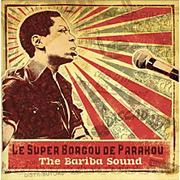Le Super Borgou de Parakou was the brainchild of Moussa Mama, who, having worked as a goldsmith in neighbouring Accra and Ghana in the 1950s, returned to Benin with a wealth of musical ideas, and a progressive vision to meld these sounds into his collective troupe. Various incarnations of these are found over The Bariba Sound‘s 15 tracks, which cover the period 1970-76, a period of political change in the country. After the abolition of slavery in 1960, Benin (at that time known as French Dahomey) gained full independence from France, with a democratic government in place until a Marxist-Leninist dictatorship, the People’s Republic of Benin, came into being in 1972 (and lasted until 1990, following years of repression and the eventual collapse of the economy).
Mama and Menou Roch, Orchestre Super Bourgou (as they are also known) co-founder and guitarist, found themselves with a platform to provide cutting social commentary on the socio-economic ills and rampant inequalities they saw around them. The group became regulars at the Congolaise bar, where they caught the attention of the founders of Benin’s most influential record label, Albarika Store (Orchestre Super Bourgou were the label’s first EP release) and this is the first widely circulated document of this chapter in Northern Benin’s rich musical history.
The Stones-y/Animals-esque R’n’B blend lick that opens the album on ‘Gandi gui’ soon makes way for the pure African soul that was ringing out through the ‘Islamic Funk Belt’ (Ghana, Togo, Nigeria and Benin) at the time. Untutored and unrestrained, what you hear is what you get, as musicians wrestle their instruments unbound by limitations, to create their pure sounds, as perfect for headphones as for the dancefloor. Their repetitive vocals make for an inclusive setting (‘Guessi-Guéré-Guessi’), inviting the listener into the musicians’ circle, as they jam on subliminal grooves.
Analog Africa’s previous releases include fellow Benin group Orchestre Poly-Rythmo de Cotonou among other retrospectives of various golden eras of sounds from across Africa, and this anthology, the label’s fifth release from the West African country, is another fine instalment. While this set is perhaps cleaner than the recent Bambara Mystic Soul compilation of fuzzy psychedelia from Burkina Faso, the rich grooves on this disc are no less potent. You’re treated to styles ranging from luxurious Afrobeat, to R’n’B, soul and funk based on heady repetition, plus polyrhythmic percussive interplay courtesy of formidable powerhouse drummer Bori Borro.
Le Super Borgou de Parakou differ from the Congolese-Cuban influenced Poly-Rythmo as they mix local influences – from Bariba and Dendi folklore, in the lyrics – with a wider range of styles from further afield: Islamic melodies and rumba, pachanga and breakbeats. The more modern styles are fitted seamlessly with the traditional. And while the group are tightly drilled throughout, the different instruments are also given space to fill-out the sound, heard best on dizzying Afrobeat funk of ‘Bninhounnin’.
We should be grateful for the effort put into releasing these expertly chosen and lovingly reproduced artifacts. The cost to label owner Samy Ben Redjeb’s personal health from collecting so many records is described in the liner notes: "Around 2007, I developed a strong allergic reaction to the fungus covering old record covers brought from Africa. Those covers, according to my doctor, are a paradise for organisms looking for a ‘moist lifestyle’. By 2009, that allergy had turned into chronic asthma and I realised drastic measures had to be taken." Luckily he had enough singles by Le Super Bourgou de Parakou to be able to share them for all here.
Moussa Mama died on October 15, 2007, his funeral attended by Orchestre Poly-Rythmo members among many other notable figures of Benin’s music scene. While he is clearly not forgotten at home, this set ensures his adaptation of indigenous and foreign sounds in the isolated rurality of Parakou with Super Borgou will live on. The Bariba Sound is up there with the best.


